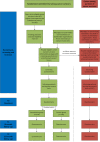Supporting participation in paid work of cancer survivors and their partners in the Netherlands: protocol of the SusTained Employability in cancer Patients and their partnerS (STEPS) multi-centre randomized controlled trial and cohort study
- PMID: 34641839
- PMCID: PMC8506084
- DOI: 10.1186/s12889-021-11865-8
Supporting participation in paid work of cancer survivors and their partners in the Netherlands: protocol of the SusTained Employability in cancer Patients and their partnerS (STEPS) multi-centre randomized controlled trial and cohort study
Abstract
Background: Many cancer survivors experience physical and/or psychosocial problems affecting return to work (RTW) and work retention. Current interventions on RTW lack evidence regarding effectiveness, while interventions for work retention are missing. Partners of cancer survivors may also experience work- and health-related outcomes; yet, these consequences are not well understood. Here, the protocol of the STEPS study is described. The study aims are to: 1) evaluate the (cost-)effectiveness of a rehabilitation program for RTW and work retention in cancer survivors, and 2) assess health- and work-related outcomes among cancer survivors' partners.
Methods: In a multicentre Randomized Controlled Trial (RCT), 236 working-age cancer survivors with an employment contract will be randomly allocated to a usual care group or an intervention group receiving a multidisciplinary rehabilitation program, combining occupational therapy facilitating work retention (e.g., energy management and self-efficacy training) and reintegration consultation addressing work-related issues (e.g., RTW planning and discussing workplace or task modifications with the supervisor). Alongside the RCT, a prospective cohort study will be conducted among cancer survivors' partners (n = 267). Participants in the RCT and cohort study will be asked to complete questionnaires at baseline, and after six and 12 months, assessing work- and health-related outcomes. Generalized estimating equations will be used to assess intervention's effectiveness, compared to usual care, regarding primary (i.e., working hours per week) and secondary outcomes. Also economic and process evaluations will be performed. For the cohort study, logistic or linear regression modelling will be applied assessing work- and health-related outcomes (primary outcome: working hours) of cancer survivors' partners, and what factors predict these outcomes.
Results: The study is planned to start in September 2021; results are expected in 2023.
Conclusion: Compared to usual care, the STEPS intervention is hypothesized to be (cost-)effective and the intervention could be a valuable addition to standard care helping cancer survivors to sustain employment. Further, it is expected that living with a cancer survivor has a substantial impact on work and health of partners, while specific groups of partners that are at particular risk for this impact are likely to be identified.
Trial registration: Dutch Trial Register ( NTR;NL9094 ; 15-12-2020).
Keywords: Cancer survivors; Clinical trial protocol; Cohort study; Spouses; Vocational rehabilitation.
© 2021. The Author(s).
Conflict of interest statement
The authors declare that they have no competing interests.
Figures
References
Publication types
MeSH terms
LinkOut - more resources
Full Text Sources
Medical



